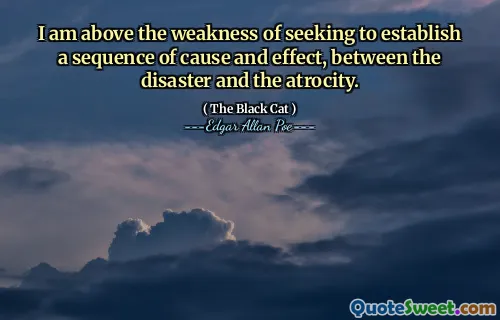
I am above the weakness of seeking to establish a sequence of cause and effect, between the disaster and the atrocity.
In "The Black Cat," Edgar Allan Poe explores the complex relationship between disaster and human behavior. The quote suggests that the narrator is beyond the inclination to link tragic events to moral failings or specific actions. This perspective hints at a deeper, perhaps more philosophical outlook on guilt and the unpredictability of fate. It implies that the chaos of life might not always have a clear rationale, challenging readers to reconsider how they perceive causality in their own lives.
The narrator's struggle with personal demons underscores the theme of inevitable ruin that permeates the story. By distancing himself from the need to explain the connection between disaster and his wrongdoing, he reflects a profound sense of despair and resignation. Poe masterfully illustrates the darkness that can arise from within, suggesting that sometimes, the reasons for our suffering are too complex to untangle or make sense of comprehensively. This ambiguity invites readers into the unsettling realm of the human psyche.










